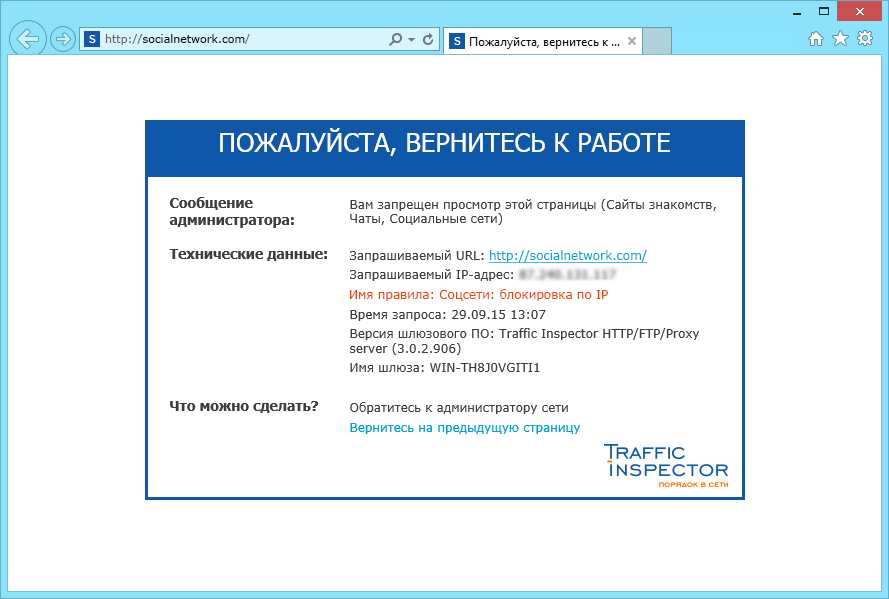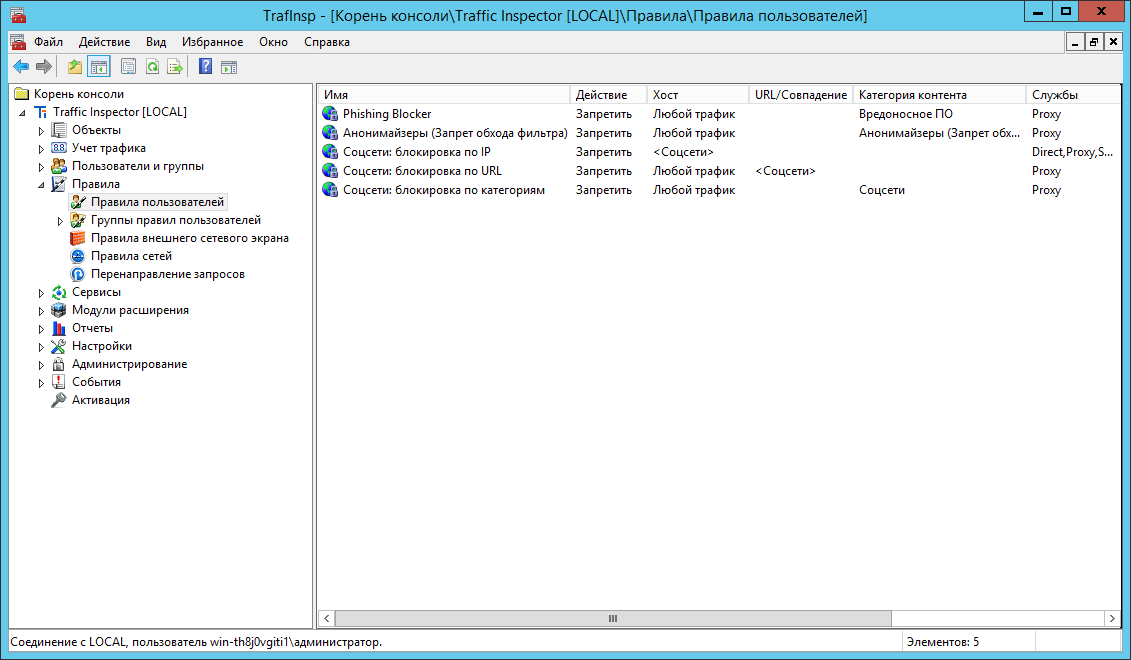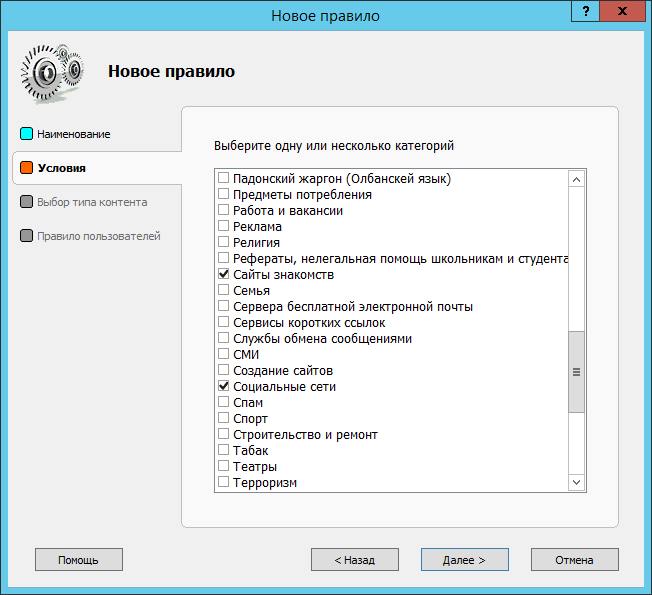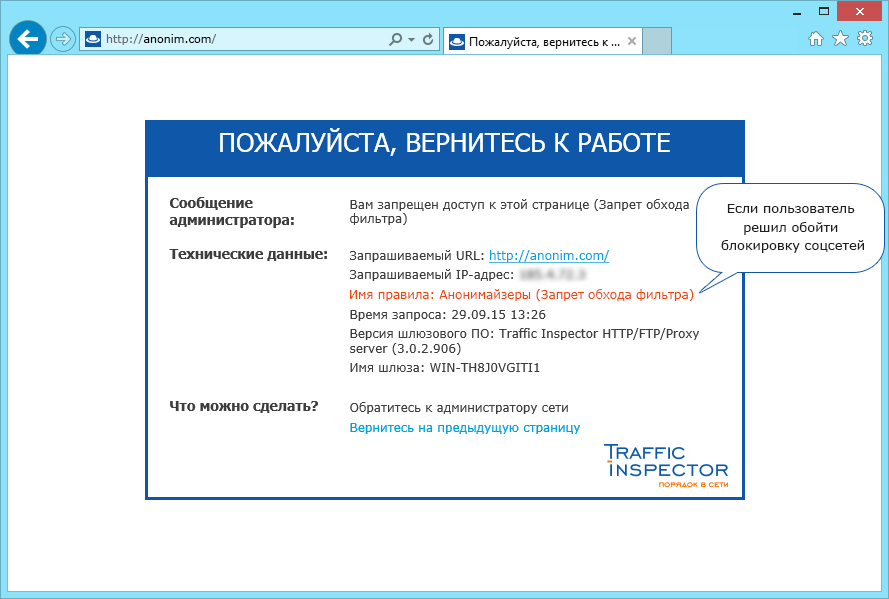No exit
How to improve employee performance by limiting their access to social networks?
34% of Russian and 30% of world companies do not allow their employees to social networks during working hours. This is evidenced by the results of a study by Ipsos, conducted by order of Microsoft. Each company has its own pros and cons. But the main thing in most cases is the same - social networks eat up the time allotted for work, and reduce the efficiency of the staff . If you are familiar with this problem, then ways to solve it will be interesting. You can block access to unwanted resources using various methods. The Traffic Inspector development team offers 3 options for how to do it.

')

Traffic Inspector can be configured to meet any requirements - deny access to social networks, block them on a schedule (for example, only during working hours), limit the user’s speed, allow access, but only to certain categories (in particular, employees whose functionality directly involves using social networks). ), allow access to everyone and keep track of which employees visit their social networks and how much time they spend on it, or take other actions, depending on the rules set by the administrator. Instead of simply blocking the social network, Traffic Inspector allows you to redirect the user to another site. For example, on the website of the company-employer. Or on the page with a recommendation not to be distracted from work.


Using a software product, an administrator can see both employees' attempts to go online (it’s enough to see blocked requests for that) and their attempts to bypass the restrictions. That is, the violator of the corporate information policy will light up in any case. Below are the main ways in which users try to deceive the system of blocking social networks, and counterarguments from Traffic Inspector.

Blocking access to social networks with the help of Traffic Inspector does not only discipline employees. It solves at least several important tasks for business management.
We gave the pros and cons and showed what the toolkit could be. And to open employees access to social networks or close - you decide.
34% of Russian and 30% of world companies do not allow their employees to social networks during working hours. This is evidenced by the results of a study by Ipsos, conducted by order of Microsoft. Each company has its own pros and cons. But the main thing in most cases is the same - social networks eat up the time allotted for work, and reduce the efficiency of the staff . If you are familiar with this problem, then ways to solve it will be interesting. You can block access to unwanted resources using various methods. The Traffic Inspector development team offers 3 options for how to do it.

')
- Block by IP addresses. Closes access to sites whose IP addresses are included in the corresponding list. This is one of the easiest and fastest ways to filter. Its only disadvantage is that social networks are located on multiple servers. Therefore, the final list of IP-addresses relating to a specific social network, you have to constantly supplement and update.

- Block by URL lists. It works with the same restriction list, but uses not IP addresses, but URL identifiers - facebook.com, vk.com, etc. This list is limited until new popular social networks appear. It is very easy to add and update.
- Blocking by content category (content filtering). The content category (search engines, email servers, social networks) is determined by IP address. Specified categories are blocked. The advantage is that the categorization and compilation of lists of addresses related to social networks are not dealt with by the administrator himself, but by a third-party organization that provides access to the categorization service.
Traffic Inspector can be configured to meet any requirements - deny access to social networks, block them on a schedule (for example, only during working hours), limit the user’s speed, allow access, but only to certain categories (in particular, employees whose functionality directly involves using social networks). ), allow access to everyone and keep track of which employees visit their social networks and how much time they spend on it, or take other actions, depending on the rules set by the administrator. Instead of simply blocking the social network, Traffic Inspector allows you to redirect the user to another site. For example, on the website of the company-employer. Or on the page with a recommendation not to be distracted from work.


Using a software product, an administrator can see both employees' attempts to go online (it’s enough to see blocked requests for that) and their attempts to bypass the restrictions. That is, the violator of the corporate information policy will light up in any case. Below are the main ways in which users try to deceive the system of blocking social networks, and counterarguments from Traffic Inspector.
- Anonymizer - a site with an arbitrary name where the user enters the URL that he wants to open. The site opens the desired page through itself. That is, shows the administrator a different URL. Traffic Inspector allows you to disable anonymizers using context filtering. Anonymizers in it are allocated in a separate category.

- VPN connection - the ability to create a secure connection with a remote resource, a separate channel within an existing connection. Users establish such a connection with any third-party VPN-server, and the administrator does not see which sites they go to. With Traffic Inspector, an administrator only needs to create a rule prohibiting users from creating VPN connections.
- The third-party proxy server works by analogy with the anonymizer. The only difference is that the user does not specify the URL, but the necessary proxy server in the browser settings. It is also blocked by the content filtering system.
Blocking access to social networks with the help of Traffic Inspector does not only discipline employees. It solves at least several important tasks for business management.
- Provides information security company
Social networking is considered by Russian IT specialists to be one of the most dangerous types of online activities. Leakage of confidential information, undermining reputation or a virus attack is much more likely for a company that uncontrollably allows employees to access social networks from a working computer. - Saves company funds
If the contract of your company with the provider provides for a certain limit of Internet traffic, you well know how much damage to the company's budget causes its overspending. However, as well as the salary paid to employees for the working time, actually spent in social networks. - Increases employee productivity
Analysts of the audit and consulting company FBK calculated that in 2012 the economic damage from the “freezing” of Russians in social networks ranged from 281.7 billion to 311.5 billion rubles. Adjust for inflation, exchange rate fluctuations and the growing popularity of social networks and calculate losses.
We gave the pros and cons and showed what the toolkit could be. And to open employees access to social networks or close - you decide.
Source: https://habr.com/ru/post/295014/
All Articles